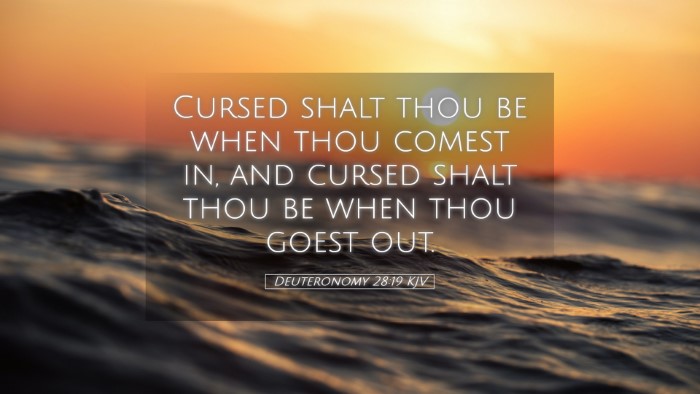Commentary on Deuteronomy 28:19
Introduction
Deuteronomy 28:19 states, "Cursed shall you be when you go out, and cursed shall you be when you come in." This verse is part of a larger section that outlines the blessings and curses associated with obedience and disobedience to God's commandments. In this commentary, we will explore the rich theological insights from public domain commentators like Matthew Henry, Albert Barnes, and Adam Clarke, providing a comprehensive analysis suitable for pastors, students, theologians, and Bible scholars.
The Context of Blessings and Curses
To fully grasp the significance of Deuteronomy 28:19, it is vital to consider its contextual placement within the chapter. Deuteronomy 28 outlines the covenantal stipulations given to the Israelites, emphasizing the duality of blessings for obedience and curses for disobedience.
-
Matthew Henry notes that the first part of the chapter details the numerous blessings that accompany adherence to God's law, which serve as motivators for the Israelites to follow His commandments faithfully.
-
Albert Barnes remarks that curses serve as a warning beacon for the nation of Israel. The use of "cursed" emphasizes the severity of the consequences that disobedience incurs.
-
Adam Clarke elaborates on the idea of curses, indicating that they reflect God's displeasure and serve a purpose in divine discipline, aiming to lead the people back to a right relationship with Him.
Exploring the Meaning of 'Cursed' and Its Implications
The term “cursed” in this verse denotes a state of being under divine judgment. It communicates the reality of living outside the favor of God. Throughout scripture, the concept of curses serves as a multifaceted theme.
-
Matthew Henry suggests that the implications of being cursed extend beyond mere misfortune; it signifies a removal of protection and blessing from God. Such a state leaves one vulnerable to the trials of life.
-
Albert Barnes emphasizes that the curse is comprehensive, affecting all aspects of life – whether going out to work or coming home. This signifies that one's entire existence is touched by the consequences of disobedience.
-
Adam Clarke connects the idea of being cursed with the concept of living without divine guidance. He posits that these curses act as a deterrent, meant to steer the Israelites away from actions that would lead to spiritual decay.
Theological Reflections on Obedience and Disobedience
Deuteronomy 28:19 encapsulates the broader theological principle of obedience and its consequent rewards versus disobedience and its penalties. It invites reflection on the practical implications of living a life aligned with the will of God.
-
Matthew Henry asserts that genuine faith is evidenced by obedience. The verse serves as a stark reminder that the faithfulness of God towards His covenant people is intrinsically tied to their response to His commandments.
-
Albert Barnes points out that love for God should manifest in obedience, suggesting that the blessings and curses outlined in this chapter act as a framework for understanding God's expectations.
-
Adam Clarke sees the curses not merely as punitive measures but as corrective. The intention behind God’s warnings is to foster a deeper commitment to live in harmony with His statutes.
Application for Today’s Believers
This verse, though written for the Israelites, carries timeless relevance for contemporary believers. It encourages self-examination regarding one's spiritual walk and obedience to God's word.
-
Matthew Henry urges Christians to consider the areas in their lives where disobedience may be hindering their experience of God's blessings.
-
Albert Barnes challenges modern believers to reflect on their actions, suggesting that the choices made in daily life have consequences that affect one's spiritual wellbeing.
-
Adam Clarke emphasizes the grace available in Christ, illustrating that even though the consequences of sin are severe, repentance can restore one's relationship with God.
Conclusion
Deuteronomy 28:19 serves as a potent reminder of the seriousness of God's commands and the repercussions of our choices. With insights drawn from Matthew Henry, Albert Barnes, and Adam Clarke, this verse underscores a foundational truth about the relationship between divine law, human conduct, and the resulting blessings or curses. It challenges believers to pursue a faithful walk with God, ensuring that they remain under the flow of His grace and favor.


